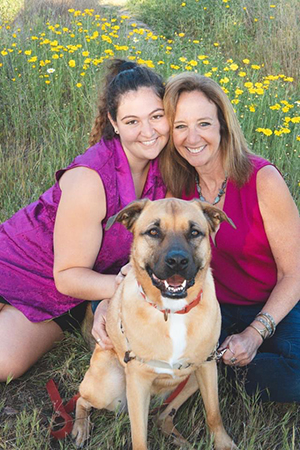By Shayna Gothard Kaufmann, Ph.D

SAN DIEGO — My “baby” daughter Maya graduated high school on a recent Friday. Woohoo! On Monday, she flew solo to Europe to visit her sister. Double Woohoo! In two months, she moves to Berkeley to start her next chapter as a University student. Woo…. Wait! What? Moving out? Completely launching? My husband and I becoming actual empty nesters? I’m not sure if I’m ready for this. I mean I knew this day would come but it always seemed so far down the road. And yet, here it is. Around the corner.
As I write this, I can feel a dropping sensation in my belly and a small lump rising in my throat. I love having Maya (and my older daughter Tara already in University) at home. She is funny, insightful, sensitive, and smart. Of course I am excited for her to spread her wings and I am going to miss her. A lot.
Maya and I have always been extremely close. We have a beautiful ease and intimacy – we laugh together easily, cry together easily and can be in silence together easily. Her journey through school was filled with challenges, and I was by her side every step of the way. I have been Maya’s constant and biggest supporter, problem solver, and fan.
And with this intimacy I also feel Maya’s ups and downs as if they are my own. When she is in pain, I am in pain. When her heart is broken, mine hurts as well. And when she is joyful, I am joyful. For a child, this is fitting. But for a young adult, not so much. Young adults find their power and build resilience when they bear more responsibility for their life experience. And as hard as it is for a parent to watch them struggle, it is our responsibility to allow it. Otherwise, we both cease growing.
Right now, I have a big job to do. A job that is long overdue and difficult. My job, my responsibility, is to fully cut our umbilical cord. My job is to allow Maya to experience and embody her absolute individuation.
This does not mean I sever my relationship with Maya or my parenting of her. No way! That never ends. But it does mean that I pull back and grant her the necessary space to fully launch. My job is to kiss her goodbye and know that she has the tools to navigate her next chapter without me. My job is to trust her to make her own decisions even if I disagree with them. And my job is to allow her to fully experience her challenges and to come out on the other side, without me intervening. This “not doing” may be one of the hardest parenting jobs I will ever “do.”
Part of me admittedly (and selfishly) wishes I didn’t have to cut the cord – that I could continue to help “fix” things and absorb some of her pain. Yet, umbilical cords are not meant to be attached forever. They are critical for a period of time, and equally critical to cut. In fact, it’s not surprising that the cutting of the cord is such a momentous moment in the birth of a baby; it is in that split second, that the infant becomes an independent separate being, able to literally breathe on her own.
Each of us, whether we are a parent or not, have versions of unsevered umbilical cords – attachments to people, things, beliefs, or even images that need severing for our growth. Perhaps it’s a community affiliation you have outgrown but fear departing. Perhaps it’s an image you are trying to maintain that is no longer authentically you. Perhaps it’s a belief about yourself that you cling to despite evidence to the contrary. Or perhaps it’s a relationship with a family member, friend, or colleague that needs space, or even complete severing, for each of you to fully breathe.
I invite you to explore your unhelpful attachments – your own unsevered umbilical cords. Is there someone or something you are attached to that is no longer serving you? Is there someone or something that holds you back rather than supporting your growth? And are you ready to explore the possibilities of what’s on the other side? If so, consider joining me. We can thank the chord and then gently and lovingly cut it. And then, we’ll have a glass of wine and see what happens together.
*
Shayna Gothard Kaufmann, Ph.D., is a clinical psychologist specializing in the problems of women between the ages of 40 and 70. Her website, Embracing the Middle, may be accessed via this link.